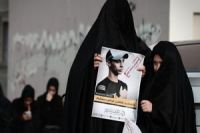Amnesty urges Bahrain to investigate death of Fadel

 Amnesty International has called on the Bahraini regime to investigate the death of 19-year-old Fadel Abbas Musalem in police custody.
Amnesty International has called on the Bahraini regime to investigate the death of 19-year-old Fadel Abbas Musalem in police custody.
The London-based group said in a statement issued on Tuesday that Musalem was shot in the head when police tried to arrest him as he was visiting a recently freed prisoner in Markh, a village near the capital Manama.
Bahrain’s Interior Ministry claimed that security forces shot the man on January 8 when he drove a car at them.
However, the Bahraini opposition bloc al-Wefaq National Islamic Society said in a statement on Sunday that Musalem attained martyrdom on Saturday because of “savage” torture during his detention.
The statement said that besides a wound to his head, Musalem’s body had signs of “bruises on his back, around the neck and on his face,” adding that the teenager also had a “deep wound to the right shoulder.”
Musalem’s family members also said that police did not inform them about his detention when they asked about him after he went missing.
His mother said that Bahrain’s Criminal Investigation Directorate told her on Sunday that her son had died.
Said Boumedouha, the Amnesty’s Middle East and North Africa deputy director, said on Tuesday, “Bahrain’s authorities must come clean and open a full, independent investigation to establish the truth about the death of Fadel Abbas. Those responsible for his death must be held to account.”
“The conflicting information that has emerged over the version of events that led to his death makes such an investigation even more urgent,” Boumedouha added.
On Sunday, thousands of people attended Abbas’s funeral in Diraz, a village on the northwest coast of Bahrain. Police clashed with the mourners.
And thousands of Bahrainis took to the streets on Monday to express anger over the death of Musalem. Again police clashed with the protesters.
The participants called on Bahraini authorities to stop suppressing Shia Muslims and denying their rights. They also slammed the ruling Al Khalifa regime for its crackdown on anti-regime protests, demanding freedom of the country’s political prisoners.
Since mid-February 2011, thousands of pro-democracy protesters have staged numerous demonstrations in the streets of the country, calling for the Al Khalifa royal family to relinquish power.
On March 14, 2011, troops from Saudi Arabia and the United Arab Emirates invaded the country to assist the Bahraini government in its crackdown on the peaceful protesters.
According to local sources, scores of people have been martyred and hundreds arrested.
Physicians for Human Rights says doctors and nurses have been detained, tortured, or disappeared because they have “evidence of atrocities committed by the authorities, security forces, and riot police” in the crackdown on anti-government protesters.







